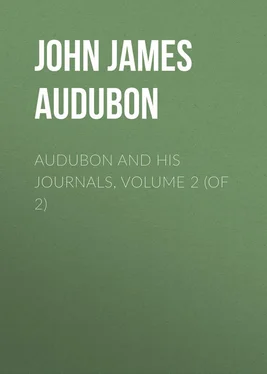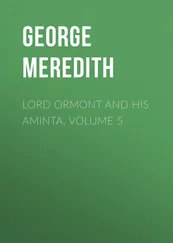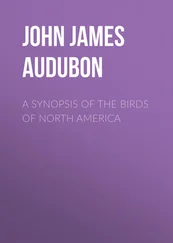John Audubon - Audubon and his Journals, Volume 2 (of 2)
Здесь есть возможность читать онлайн «John Audubon - Audubon and his Journals, Volume 2 (of 2)» — ознакомительный отрывок электронной книги совершенно бесплатно, а после прочтения отрывка купить полную версию. В некоторых случаях можно слушать аудио, скачать через торрент в формате fb2 и присутствует краткое содержание. Жанр: foreign_antique, foreign_prose, на английском языке. Описание произведения, (предисловие) а так же отзывы посетителей доступны на портале библиотеки ЛибКат.
- Название:Audubon and his Journals, Volume 2 (of 2)
- Автор:
- Жанр:
- Год:неизвестен
- ISBN:нет данных
- Рейтинг книги:5 / 5. Голосов: 1
-
Избранное:Добавить в избранное
- Отзывы:
-
Ваша оценка:
- 100
- 1
- 2
- 3
- 4
- 5
Audubon and his Journals, Volume 2 (of 2): краткое содержание, описание и аннотация
Предлагаем к чтению аннотацию, описание, краткое содержание или предисловие (зависит от того, что написал сам автор книги «Audubon and his Journals, Volume 2 (of 2)»). Если вы не нашли необходимую информацию о книге — напишите в комментариях, мы постараемся отыскать её.
Audubon and his Journals, Volume 2 (of 2) — читать онлайн ознакомительный отрывок
Ниже представлен текст книги, разбитый по страницам. Система сохранения места последней прочитанной страницы, позволяет с удобством читать онлайн бесплатно книгу «Audubon and his Journals, Volume 2 (of 2)», без необходимости каждый раз заново искать на чём Вы остановились. Поставьте закладку, и сможете в любой момент перейти на страницу, на которой закончили чтение.
Интервал:
Закладка:
June 17, Saturday. Warm and fair, with the river rising fast. The young fawn was hung up, and I drew it. By dinner-time Sprague had well prepared the Gray Wolf, and I put him to work at the fawn. Bell went shooting, and brought five or six good birds. The song of the Lazuli Finch so much resembles that of the Indigo Bird that it would be difficult to distinguish them by the note alone. They keep indifferently among the low bushes and high trees. He also brought a few specimens of Spermophilus hoodii of Richardson, 19 19 This is a synonym of Spermophilus tridecem-lineatus , the Thirteen-lined, or Federation Sphermophile, the variety that is found about Fort Union being S. t. pallidus . – E. C.
of which the measurements were taken. Wolves often retreat into holes made by the sinking of the earth near ravines, burrowing in different directions at the bottoms of these. I sent Provost early this morning to the Opposition fort, to inquire whether Mr. Cutting had written letters about us, and also to see a fine Kit Fox, brought in one of their boats from the Yellowstone. Much has been done in the way of loading the Mackinaw boats. Bell has skinned the young Wolf, and Sprague will perhaps finish preparing the fawn. The hunters who went out yesterday morning have returned, and brought back a quantity of fresh Buffalo meat. Squires brought many fragments of a petrified tree. No Antelopes were shot, and I feel uneasy on this score. Provost returned and told me Mr. Cutting's men with the letters had not arrived, but that they were expected hourly. The Kit Fox had been suffocated to death by some dozens of bundles of Buffalo robes falling on it, while attached to a ladder, and had been thrown out and eaten by the Wolves or the dogs. This evening, quite late, I shot a fine large Gray Wolf. I sincerely hope to see some Antelopes to-morrow, as well as other animals.
June 18, Sunday. This day has been a beautiful, as well as a prosperous one to us. At daylight Provost and Alexis went off hunting across the river. Immediately after an early breakfast, Mr. Murray and three Mackinaw boats started for St. Louis. After the boats were fairly out of sight, and the six-pounders had been twice fired, and the great flag floated in the stiff southwesterly breeze, four other hunters went off over the river, and Squires was one of them. I took a walk with Mr. Culbertson and Mr. Chardon, to look at some old, decaying, and simply constructed coffins, placed on trees about ten feet above ground, for the purpose of finding out in what manner, and when it would be best for us to take away the skulls, some six or seven in number, all Assiniboin Indians. It was decided that we would do so at dusk, or nearly at dark. My two companions assured me that they never had walked so far from the fort unarmed as on this occasion, and said that even a single Indian with a gun and a bow might have attacked us; but if several were together, they would pay no attention to us, as that might be construed to mean war. This is a good lesson, however, and one I shall not forget. About ten o'clock Alexis came to me and said that he had killed two male Antelopes, and Provost one Deer, and that he must have a cart to bring the whole in. This was arranged in a few minutes; and Harris and I went across the river on a ferry flat, taking with us a cart and a most excellent mule. Alexis' wife went across also to gather gooseberries. The cart being made ready, we mounted it, I sitting down, and Harris standing up. We took an old abandoned road, filled with fallen timber and bushes innumerable; but Alexis proved to be an excellent driver, and the mule the most active and the strongest I ever saw. We jogged on through thick and thin for about two miles, when we reached a prairie covered with large bushes of Artemisia (called here "Herbe Sainte"), and presently, cutting down a slope, came to where lay our Antelope, a young male, and the skin of the Deer, while its carcass hung on a tree. These were placed in the cart, and we proceeded across the prairie for the other Antelope, which had been tied by the horns to a large bush of Artemisia, being alive when Alexis left it; but it was now dead and stiff. I looked at its eyes at once. This was a fine old male with its coat half shed. I was sorry enough it was dead. We placed it by its relation in the cart, jumped in, and off we went at a good round trot, not returning to the road, but across the prairie and immediately under the clay hills where the Antelope go after they have fed in the prairie below from early dawn until about eight o'clock; there are of course exceptions to the contrary. Part of the way we travelled between ponds made by the melting of the snows, and having on them a few Ducks and a Black Tern, all of which no doubt breed here. After we had passed the last pond, we saw three Antelopes several hundred yards to the lee of us; the moment they perceived us Alexis said they would be off; and so they were, scampering towards the hills until out of sight. We now entered the woods, and almost immediately Harris saw the head of a Deer about fifty yards distant. Alexis, who had only a rifle, would have shot him from the cart, had the mule stood still; but as this was not the case, Alexis jumped down, took a long, deliberate aim, the gun went off, and the Deer fell dead in its tracks. It proved to be a doe with very large milk-bags, and doubtless her fawn or fawns were in the vicinity; but Alexis could not find them in the dense bush. He and Harris dragged her to the cart, where I stood holding the mule. We reached the ferry, where the boat had awaited our return, placed the cart on board without touching the game; and, on landing at the fort, the good mule pulled it up the steep bank into the yard. We now had two Antelopes and two Deer that had been killed before noon. Immediately after dinner, the head of the old male was cut off, and I went to work outlining it; first small, with the camera, and then by squares. Bell was engaged in skinning both the bodies; but I felt vexed that he had carelessly suffered the Gray Wolf to be thrown into the river. I spoke to him on the subject of never losing a specimen till we were quite sure it would not be needed; and I feel well assured he is so honest a man and so good a worker that what I said will last for all time. While looking at the Deer shot this day, Harris and I thought that their tails were very long, and that the animals themselves were very much larger than those we have to the eastward; and we all concluded to have more killed, and examine and measure closely, as this one may be an exception. It was unfortunate we did not speak of this an hour sooner, as two Deer had been killed on this side the river by a hunter belonging to the fort; but Mr. Culbertson assured me that we should have enough of them in a few days. I am told that the Rocky Mountain Rams lost most of their young during the hard frosts of the early spring; for, like those of the common sheep, the lambs are born as early as the 1st of March, and hence their comparative scarcity. Harris and Bell have shot a handsome White Wolf, a female, from the ramparts; having both fired together, it is not known which shot was the fatal one. Bell wounded another in the leg, as there were several marauders about; but the rascal made off.
June 19, Monday. It began raining early this morning; by "early," I mean fully two hours before daylight. The first news I heard was from Mr. Chardon, who told me he had left a Wolf feeding out of the pig's trough, which is immediately under the side of the fort. The next was from Mr. Larpenteur, 20 20 Charles Larpenteur, whose MS. autobiography I possess. – E. C.
who opens the gates when the bell rings at sunrise, who told us he saw seven Wolves within thirty yards, or less, of the fort. I have told him since, with Mr. Chardon's permission, to call upon us before he opens these mighty portals, whenever he espies Wolves from the gallery above, and I hope that to-morrow morning we may shoot one or more of these bold marauders. Sprague has been drawing all day, and I a good part of it; and it has been so chilly and cold that we have had fires in several parts of the fort. Bell and Harris have gone shooting this afternoon, and have not yet returned. Bell cleaned the Wolf shot last night, and the two Antelopes; old Provost boiled brine, and the whole of them are now in pickle. There are some notions that two kinds of Deer are found hereabouts, one quite small, the other quite large; but of this I have no proof at present. The weather was too bad for Alexis to go hunting. Young Mr. McKenzie and a companion went across the river, but returned soon afterwards, having seen nothing but one Grizzly Bear. The water is either at a stand, or falling a little. — Later . Harris and Bell have returned, and, to my delight and utter astonishment, have brought two new birds: one a Lark, 21 21 This is the first intimation we have of the discovery of the Missouri Titlark, which Audubon dedicated to Mr. Sprague under the name of Alauda spragueii , B. of Am. vii., 1844, p. 334, pl. 486. It is now well known as Anthus (Neocorys) spraguei . – E. C.
small and beautiful; the other like our common Golden-winged Woodpecker, but with a red mark instead of a black one along the lower mandible running backward. 22 22 Here is the original indication of the curious Flicker of the Upper Missouri region, which Audubon named Picus ayresii , B. of Am. vii., 1844, p. 348, pl. 494, after W. O. Ayres. It is the Colaptes hybridus of Baird, and the C. aurato-mexicanus of Hartlaub; in which the specific characters of the Golden-winged and Red-shafted Flickers are mixed and obscured in every conceivable degree. We presently find Audubon puzzled by the curious birds, whose peculiarities have never been satisfactorily explained. – E. C.
I am quite amazed at the differences of opinion respecting the shedding – or not shedding – of the horns of the Antelope; 23 23 The fact that the Antilocapra americana does shed its horns was not satisfactorily established till several years after 1843. It was first brought to the notice of naturalists by Dr. C. A. Canfield of California, April 10, 1858, and soon afterward became generally known. (See Proc. Zoöl. Soc. Lond. 1865, p. 718, and 1866, p. 105.) Thereupon it became evident that, as Audubon says, these animals are not true Antelopes, and the family Antilocapridæ was established for their reception. On the whole subject see article in Encycl. Amer. i., 1883, pp. 237-242, figs. 1-5. – E. C.
and this must be looked to with the greatest severity, for if these animals do shed their horns, they are no longer Antelopes . We are about having quite a ball in honor of Mr. Chardon, who leaves shortly for the Blackfoot Fort.
Интервал:
Закладка:
Похожие книги на «Audubon and his Journals, Volume 2 (of 2)»
Представляем Вашему вниманию похожие книги на «Audubon and his Journals, Volume 2 (of 2)» списком для выбора. Мы отобрали схожую по названию и смыслу литературу в надежде предоставить читателям больше вариантов отыскать новые, интересные, ещё непрочитанные произведения.
Обсуждение, отзывы о книге «Audubon and his Journals, Volume 2 (of 2)» и просто собственные мнения читателей. Оставьте ваши комментарии, напишите, что Вы думаете о произведении, его смысле или главных героях. Укажите что конкретно понравилось, а что нет, и почему Вы так считаете.












